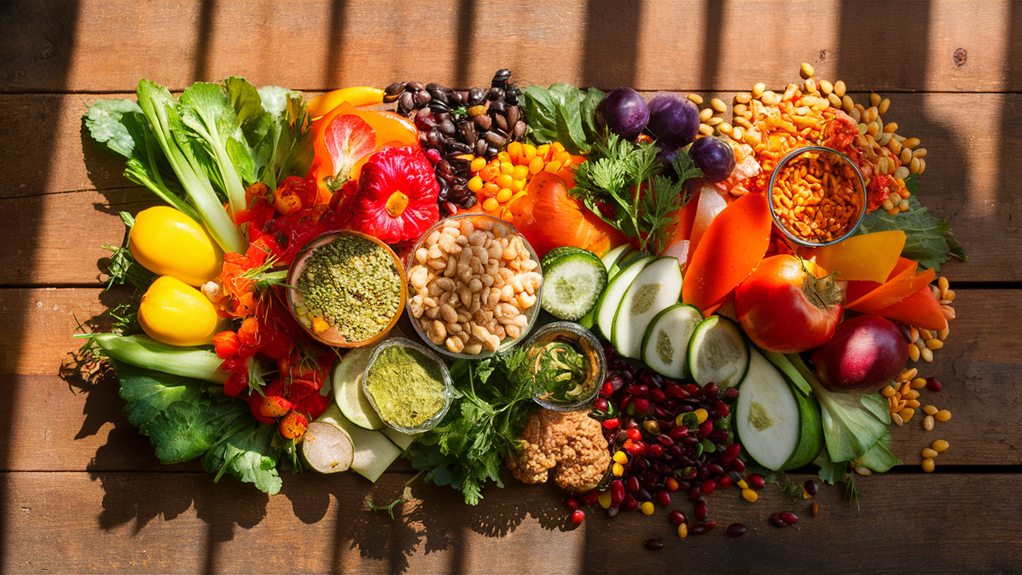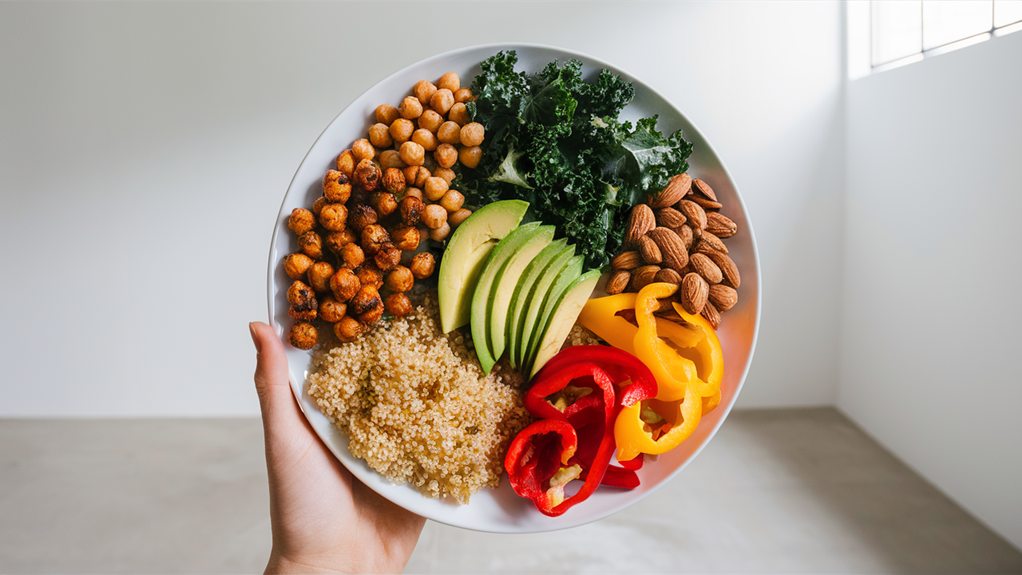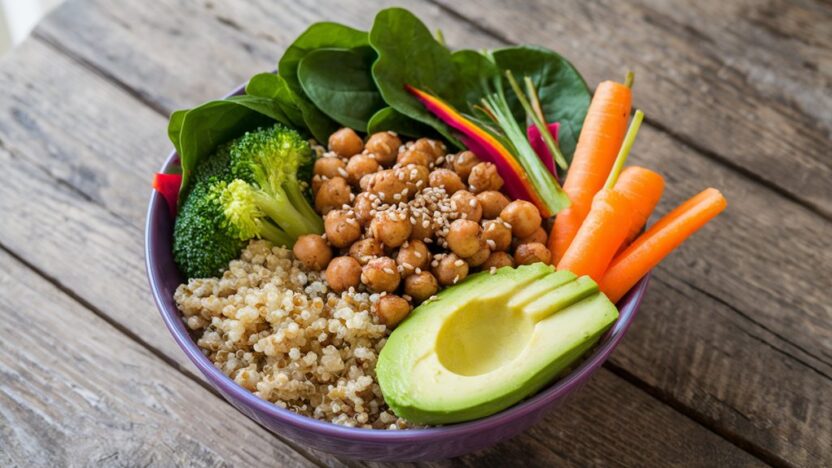Plant-based diets offer you an effective and sustainable approach to weight management through their unique combination of high-fiber foods and naturally lower calorie density. You'll find that fruits, vegetables, whole grains, and legumes provide filling nutrients while naturally reducing your overall calorie intake. The high fiber content helps you feel satisfied longer, and you can often eat larger portions of these foods while still maintaining a healthy weight. Plant-based eating also supports better gut health and improved metabolism, which are key factors in successful weight management. With proper planning and the right nutrient-rich foods, you'll discover a wealth of strategies to achieve your weight goals.
Understanding Plant-Based Eating

Plant-based diets frequently get misinterpreted as strictly vegan or vegetarian lifestyles, but they're actually more flexible than that. When you adopt a plant-based approach, you'll focus on eating mostly foods that come from plants, including fruits, vegetables, nuts, seeds, whole grains, and legumes, while reducing your intake of animal products.
This type of eating can also support your fitness goals by ensuring you meet essential nutrient needs, such as protein and iron, for ideal performance and recovery Boost Your Fitness.
Unlike a vegan diet, which completely eliminates all animal-derived foods, plant-based eating allows you to decide how much you want to include or exclude. You might choose to eat small portions of meat occasionally, enjoy eggs at breakfast, or keep dairy in your diet while making plants the stars of your plate.
The key is understanding that plant-based eating exists on a spectrum, where you can customize it to fit your needs and preferences.
When you're getting started, focus on adding rather than subtracting foods. You'll want to experiment with new plant foods, try different cooking methods, and gradually increase the proportion of plant-based meals in your diet.
This approach makes the shift more manageable and sustainable for long-term success.
Benefits for Weight Loss
When you immerse yourself in a plant-forward eating pattern, you'll typically find that managing your weight becomes more natural.
Plant-based foods generally have lower calorie density than animal products, which means you can eat larger portions while consuming fewer calories overall. This approach helps you feel satisfied and nourished without overindulging.
Additionally, incorporating high-fiber foods into your diet not only promotes feelings of fullness but also aids in digestion, making it easier to maintain a healthy weight the power of fiber.
The weight management benefits of plant-based eating are significant, and you'll likely experience several positive changes:
- Your fiber intake will increase substantially, helping you feel full longer and supporting healthy digestion.
- You'll naturally reduce your consumption of saturated fats, as most plant foods are naturally low in unhealthy fats.
- Your meals will contain more water and air volume, which helps control calorie density while maintaining portion sizes.
- You'll tend to eat more mindfully, as plant-based meals often require more careful food preparation and attention.
Essential Nutrients and Sources

Success on a plant-based diet requires careful attention to essential nutrients. When you're following this eating style, you'll need to focus on getting adequate amounts of specific nutrients that are typically found in animal products. Your body needs vitamin B12, iron, calcium, vitamin D, and zinc, which you can obtain through carefully selected plant foods and supplements.
It's important to be aware that certain nutrients, like omega-3 fatty acids, may also require specific plant sources to guarantee you're meeting your dietary needs, such as essential nutrients for vegetarians that may not be readily available in a typical diet.
To meet your plant protein needs, you'll want to include a variety of legumes, such as lentils, chickpeas, and black beans, along with whole grains like quinoa and brown rice. You can also rely on nuts, seeds, and meat alternatives made from soy or pea protein.
For iron, dark leafy greens like spinach and kale are excellent choices, while fortified plant milk and tofu can provide your calcium requirements. Since vitamin B12 isn't naturally present in plant foods, you'll need to incorporate fortified foods or take a supplement.
Nutritional yeast, which has a pleasant cheesy flavor, can be an excellent source of B vitamins and protein, making it a valuable addition to your plant-based meals.
Meal Planning Strategies
Understanding how to combine these nutrient-rich foods into balanced meals forms the foundation of effective meal planning. When you're following a vegetarian diet, you'll want to create meals that aren't just nutritious but also satisfying and delicious. Incorporating a variety of plant-based protein sources like legumes, tofu, and tempeh will guarantee you meet your protein needs while enjoying diverse flavors.
By taking time to plan your meals in advance, you'll find it easier to maintain a healthy weight while meeting all your nutritional needs.
To make your meal planning journey successful, follow these practical steps:
- Start with a weekly calendar, mapping out your main meals and considering your schedule to guarantee you'll have time to prepare the foods you've chosen.
- Build each meal around a protein source, such as beans, lentils, or tofu, then add whole grains and colorful vegetables for balance.
- Prep ingredients in advance, washing and chopping vegetables on weekends, and cooking larger batches of grains to use throughout the week.
- Keep a well-stocked pantry with staples like quinoa, nuts, seeds, and canned legumes, so you'll always have the basics for a quick, nutritious meal.
Remember to include a variety of textures and flavors in your meals, which will help you stay excited about your food choices.
Common Challenges and Solutions

Despite the many benefits of plant-based eating, you'll likely encounter several common challenges along your weight management journey. One frequent hurdle is getting enough plant-based protein, which you can overcome by incorporating legumes, quinoa, tempeh, and seitan into your daily meals.
It's important to guarantee that children on a plant-based diet receive adequate nutrients, including protein, to support their growth and development. Nourishing kids effectively is vital as you navigate these dietary changes.
Another challenge is dealing with social situations, where you might feel pressured to eat non-plant-based foods or face limited menu options when dining out.
You might also struggle with feeling satisfied after meals, especially during your shift to plant-based eating. To address this, focus on fiber-rich foods like whole grains, nuts, and seeds, which will help you feel fuller for longer.
If you're experiencing cravings for non-plant foods, try finding plant-based alternatives that satisfy similar taste preferences, such as mushrooms for meaty textures or nutritional yeast for cheesy flavors.
Remember that meal preparation can take more time initially, but you'll become more efficient as you learn to batch cook and develop a routine.
With proper planning and persistence, you can successfully navigate these challenges while maintaining your weight management goals.
Research and Success Stories
Scientific evidence continues to support the effectiveness of plant-based diets for weight management. Studies from major universities, including Harvard and Oxford, have shown that people following plant-based diets typically consume fewer calories while feeling more satisfied with their meals.
Additionally, adopting a low-carb approach alongside plant-based eating can enhance weight loss efforts and improve overall health, as demonstrated by the positive effects on better heart health. You'll find countless success stories from individuals who've achieved their weight loss goals through plant-based eating.
Research has revealed several key reasons why plant-based diets work so well for weight management:
- Participants in plant-based studies consistently report feeling fuller longer, thanks to the high fiber content in fruits, vegetables, and whole grains.
- Plant-based dieters naturally consume fewer calories while eating larger portions, since plant foods are typically less calorie-dense.
- Those following plant-based diets show improved insulin sensitivity, which helps regulate appetite and metabolism.
- Studies indicate that plant-based eaters have more diverse gut bacteria, which may contribute to better weight management.
You'll find inspiration in real-world examples, like Sarah, who lost 50 pounds after switching to a plant-based diet, or Michael, who reversed his diabetes while dropping 75 pounds through whole-food, plant-based eating.



